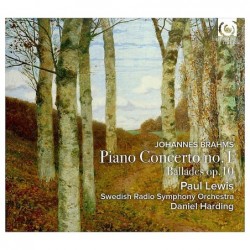





Polityka prywatności

Zasady dostawy

Zasady reklamacji
Klasyczna Muzyka Romantyczna
premiera polska: 2016-04-11
kontynent: Europa
opakowanie: digipackowe etui
opis:
Paul Lewis - jeden z najwybitniejszych pianistów swojej generacji, dysponujący rozległym repertuarem. Jego charyzmatyczne interpretacje dzieł klasyczno-romantycznych zyskały szereg entuzjastycznych recenzji międzynarodowej krytyki.
Wśród licznych laurów zdobytych przez artystę można wyróżnić m.in. Diapason d’Or, Preis der Deutschen Schallplattenkritik oraz nagrody Edisona i magazynu Gramophone. W 2016 r. został odznaczony Orderem Komandorskim Imperium Brytyjskiego.
Jako solista regularnie koncertuje z czołowymi orkiestrami, takimi jak Boston Symphony Orchestra, Royal Concertgebouw Orchestra, London Symphony Orchestra, Cleveland Orchestra, NHK Symphony Orchestra, Tonhalle-Orchester Zürich czy Gewandhausorchester Leipzig.
Wśród przedsięwzięć pianisty w sezonie 2016/2017 można wymienić m.in. wspólne projekty z Orchestre de Paris (dyr. Daniel Harding), Philharmonia Orchestra (dyr. Andris Nelsons), Chicago Symphony Orchestra (dyr. Manfred Honeck) i Symphonieorchester des Bayerischen Rundfunks (dyr. Bernard Haitink).
Występował z recitalami m.in. w Royal Festival Hall, Carnegie Hall, Musikverein, Théâtre des Champs–Élysées, Concertgebouw. Jest często zapraszany do udziału w prestiżowych festiwalach w Tanglewood, Rawinii, Salzburgu, Lucernie i Londynie.
Jego imponujący dorobek fonograficzny obejmuje uhonorowane wieloma nagrodami albumy, które ukazały się nakładem Harmonia Mundi.
Paul Lewis studiował w klasie Joan Havill w Guildhall School of Music and Drama w Londynie, następnie kształcił się pod kierunkiem Alfreda Brendela. Jest dyrektorem artystycznym festiwalu Midsummer Music w Buckinghamshire i Międzynarodowego Konkursu Pianistycznego w Leeds.
classicalsource.com - * * * *
Given the honesty of Paul Lewis's playing, the detail and darkness of Daniel Harding's conducting, and the fulsome weight and solo highlights of the Swedish Radio Symphony Orchestra, this is a performance of the Brahms D-minor to savour. Lewis and Harding complement each other aristocratically, dramatising the young Brahms, still in his twenties, as a tormented soul finding his way and identity against the backcloth of the 1850s, industrial Germany, and a politically troubled Europe.
Essentially, Lewis articulates Brahms the texturalist, the sonata herald of muscle and sinew carrying Beethoven’s banner, crafting lines and dissonances, welding the piano's emergent iron-frame sounds and new possibilities, into cathedrals of lofty sound. He projects the tonal, harmonic and structural dynamic of the opening Maestoso directly, letting it speak for itself, leaving fussiness and exaggeration to others. He brings a cool lied phrasing, an unsentimental poetry, to the Adagio – Brahms's portrait of (love letter to) Clara Schumann – not surging the emotions until the rising, deliriously shaped trills that draw the movement to a close. In the (Beethoven-derived) Finale he lets fly a tempestuous, big-boned, pianism, presaged but checked in the first movement, which explodes grittily in two epic cadenzas and a racing, roaring coda.
Reading the page for what it is, always thinking bass-upwards, Lewis encourages us to hear afresh the gruff revolution in Brahms's piano writing – a personalised view of the instrument drawing on the orchestral tutti and ensemble conversazione approach of Beethoven and Schubert (to a lesser extent Robert Schumann) radically contrary to the (more readily digested) vocalise manners and roulades of the Field-Chopin-Liszt-Thalberg-Henselt school. Lewis can thunder and glitter with the best (precision fingerwork digging deep, massive chords, quality-weighted double-octaves to silence a battlefield), but, conspicuously, that is never his priority.
Seeking out penetrating currents, applying a microscopic eye to register, balance and colour, giving his players their moments of song, unafraid to wind up the tension or electrify the dynamic range, always rhythmically charged, Harding – the connoisseur symphonist and concerto-partner to have these days – sculpts a remarkable framing canvas. This is Brahms paragraphed grandly, a novice maybe but already the crucible of things to come in Mahler and Sibelius – a painter of pictures as much as a debater of ideas, a man of passion.
Contrastingly, the 1854 Ballades – a problematic cycle interpretatively – impress less, maybe because Lewis's response seems not so lived-in. Quicker than Gilels or Michelangeli (others too), he gets through the notes but, moments of rumination aside (Nos.2 and 4), without much tension or fantasy – comparing his and Gilels's readings of the B-minor, No.3, the one relatively flaccid, the other drawn-out but paradoxically tauter, is particularly instructive. The pointed adjectives of Roman Hinke's booklet note get to the heart of the matter rather more.
Martin Sauer's production is all one would expect. However, Julian Schwenkner's engineering of the Ballades, despite a finely caught bass end, is rather opaque.
by Ateş Orga
muzycy:
Paul Lewis
Swedish Radio Symphony Orchestra
Daniel Harding
utwory:
Piano Concerto No.1 in D minor, Op.15
4 Ballades, Op.10
total time - 72:12
wydano: 2016
more info: www.harmoniamundi.com
Opis